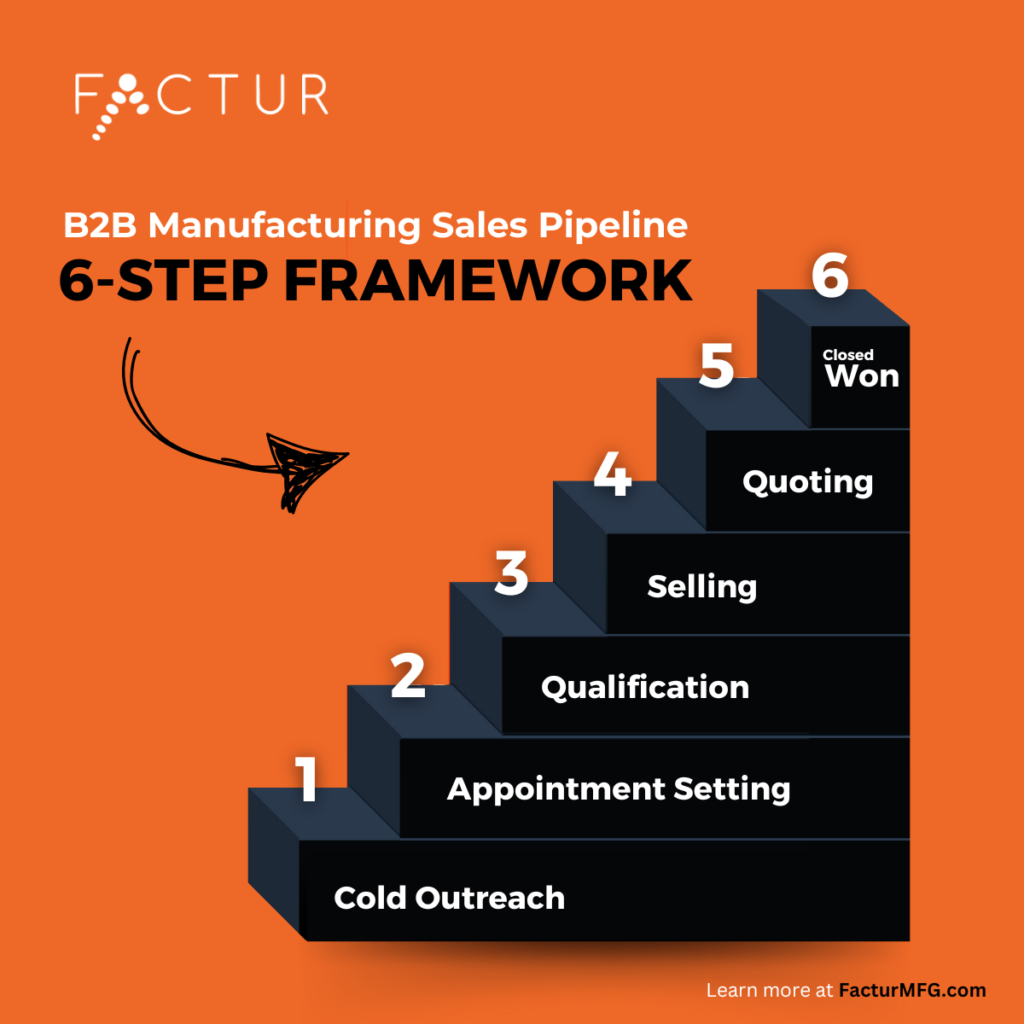Your organization’s growth and success are tied to how well you manage your sales. Whether you’re a B2B manufacturer, industrial supplier, or service provider selling to manufacturers, having a well-defined sales strategy is not just important–it’s essential.

B2B sales in manufacturing can be complex. Depending on the nature of your products or services, the sales cycle’s length, the intricacy of your offerings, their price point, and the number of decision-makers involved, things can quickly get tangled. That’s why a planned-out sales process provides a structured framework.
Let’s explore why establishing a manufacturing sales process is crucial for your business, regardless of whether you already have a sales team or not.
Why You Need a Sales Process in the Manufacturing Industry
Having a clear sales process is a crucial part of sales enablement for manufacturing companies. Sales enablement is about giving your sales reps the strategy, tools, resources, and training they need to engage with potential customers effectively and close deals.
The sales process is like a roadmap within this strategy, providing a structured plan for your salespeople to follow. It ensures that every interaction with a potential customer is purposeful and consistent, aligning with your business goals.
By including a sales process in your sales enablement strategy, you give your team a clear path to guide their efforts. Here’s why:
Consistency across sales reps
A well-documented sales process brings consistency to your sales enablement efforts. It ensures that every member of your team follows the same steps, delivers a consistent message, and maintains a uniform customer experience. This consistency builds trust and reliability.
Efficiency in moving deals through your pipeline
By having a defined process, you reduce the chances of wasting time and resources on unqualified leads or missing out on valuable opportunities. You can track progress at each stage, identify bottlenecks, and optimize your sales pipeline for efficiency.
Accountability for your sales reps
In a structured sales process, accountability becomes crystal clear. You can measure the performance of your salespeople, identify areas where improvement is needed, and reward success. This data-driven approach empowers your team to continuously enhance their skills and results.
Adaptability to changes in your sales environment
The manufacturing industry is ever-evolving, and so are customer needs. With a flexible sales process in place, you can adapt to changing market conditions, customer preferences, and competitive pressures. It enables you to pivot when necessary, ensuring your business remains agile and responsive.
Scalability across new & existing team members
As your B2B manufacturing business grows, a well-defined sales process becomes even more important. It provides the scalability needed to onboard new sales team members seamlessly, expand into new markets, and handle increased sales volumes without compromising quality.
Basic Stages for a Streamlined Sales Process
Think of your sales process as a roadmap. It guides both you and your sales team through the journey from prospecting to closing a deal.
Many of our successful manufacturing clients rely on a streamlined 6-step framework, but yours may vary to suit your unique needs. Simplicity is key here – overcomplicating the process can lead to confusion and inefficiency.

Stage 1: Cold Outreach
At this stage, you identify potential prospects that fit within your Ideal Customer Profile and make initial contact. This includes tactics, like cold calling, email outreach, or reaching out directly via LinkedIn.
Stage 2: Appointment Setting
Once you’ve piqued their interest, it’s time to schedule meetings. This is where you dive deeper into their needs and demonstrate how your solutions align.
Stage 3: Qualification
Not every lead is a good fit. In this stage, you assess whether your prospect is genuinely interested, and can benefit from your offerings.
Stage 4: Selling
With qualified leads in your pipeline, it’s time to sell. This stage involves presenting your product or service in detail to your potential customers, addressing concerns, and persuading them to choose you.
Stage 5: Quoting
After winning them over, you provide a formal quote or proposal, outlining the specifics of the deal, including pricing, terms, and delivery schedules.
Stage 6: Closed Won
This is the finish line. When a prospect accepts your proposal and becomes a customer, you mark it as “Closed Won.”
But what if a deal doesn’t materialize? Instead of abandoning ship with a “Closed Lost” lead, prospect and nurture lost leads in the long term. Needs and circumstances can change, and persistence can pay off.
For example, at Factur, we mark these opportunities as “Long-Term Follow-up” and set a follow-up date within our CRM.
This can be escalated to a date that’s sooner if we see a prospect on our website, for example, which can trigger an event to reach out much sooner.
The Role of CRM in Managing Your Manufacturing Sales Process
While a defined sales process seems great in theory, it can be difficult to track without a CRM. Customer Relationship Management (CRM) software streamlines the management of a sales process. It’s a must-have and indispensable tool to manage and improve your sales process.
When properly implemented, your CRM will help with the following functions:
Centralization of your prospect and customer data
A CRM serves as a central hub for all your customer and prospect data. It allows you to store contact information, interactions, preferences, and other details in one place. This not only makes sure your data is accurate but also makes it easily accessible to your sales team.
Centralizing your data for prospects is important as well. If you’re not aligned as an organization on who your prospects are, it’s going to be difficult to measure how your sales and marketing efforts are impacting your overall business goals and objectives.
Visualization of your pipeline across all sales reps
CRM software helps you visualize and manage your sales pipeline effectively. You can track leads through each stage of the process, monitor their progress, and identify areas where attention is needed.
Automating tasks on behalf of your reps
CRM systems can automate repetitive tasks, such as sending follow-up emails, scheduling appointments, and setting reminders. Sales automation frees up your team’s time, allowing them to focus on building relationships and closing deals.
Understanding how your reps stack up against each other
With a CRM, you gain valuable insights into your sales performance. You can generate reports, analyze trends, and make data-driven decisions to refine your sales strategies.
Improving collaboration between sales managers and sales reps
In a team-based sales environment, a CRM promotes collaboration. Team members can access shared data, communicate effectively, and coordinate their efforts to provide a seamless customer experience.
Providing intelligence on your prospects and customers
CRM software helps you understand your customers better. You can track their interactions with your business, preferences, and feedback, allowing you to tailor your offerings and services to their needs.
How Will You Optimize Your Sales Process to Drive Success?
Whether you’re a seasoned B2B manufacturing business or just starting in this industry, ask yourself this: Can you afford not to have a well-defined sales process and a robust CRM system in place?



